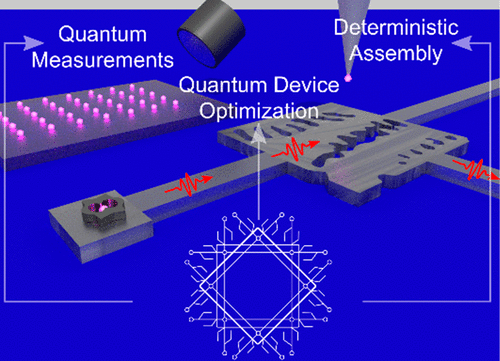当前位置:
X-MOL 学术
›
ACS Photonics
›
论文详情
Our official English website, www.x-mol.net, welcomes your
feedback! (Note: you will need to create a separate account there.)
Machine Learning for Integrated Quantum Photonics
ACS Photonics ( IF 6.5 ) Pub Date : 2020-12-24 , DOI: 10.1021/acsphotonics.0c00960 Zhaxylyk A. Kudyshev 1, 2 , Vladimir M. Shalaev 1, 2 , Alexandra Boltasseva 1, 2
ACS Photonics ( IF 6.5 ) Pub Date : 2020-12-24 , DOI: 10.1021/acsphotonics.0c00960 Zhaxylyk A. Kudyshev 1, 2 , Vladimir M. Shalaev 1, 2 , Alexandra Boltasseva 1, 2
Affiliation

|
Realization of integrated quantum photonics is a key step toward scalable quantum applications such as quantum computing, sensing, information processing, and quantum material metrology. To enable practical quantum photonic systems, several challenges should be addressed, including (i) the realization of deterministic, bright, and stable single-photon emission operating at THz rates and at room temperatures, (ii) on-chip integration of efficient single-photon sources, and (iii) the development of deterministic and scalable nanoassembly of quantum circuitry elements. In this Perspective, we focus on the emerging field of physics-informed machine learning (ML) quantum photonics that is envisioned to play a decisive role in addressing the above challenges. Specifically, three directions of ML-assisted quantum research are discussed: (i) rapid preselection of single single-photon sources via ML-assisted quantum measurements, (ii) hybrid ML-optimization approach for developing efficient quantum circuits elements, and (iii) ML-based frameworks for developing novel deterministic assembly of on-chip quantum emitters.
中文翻译:

集成量子光子学的机器学习
集成量子光子学的实现是迈向可扩展量子应用(例如量子计算,传感,信息处理和量子材料计量学)的关键一步。为了实现实用的量子光子系统,应该解决几个挑战,包括(i)实现在THz速率和室温下运行的确定性,明亮和稳定的单光子发射,(ii)高效单芯片的片上集成光子源;以及(iii)确定性和可扩展的量子电路元件纳米组件的开发。在本《观点》中,我们专注于物理信息机器学习(ML)量子光子学的新兴领域,该领域有望在解决上述挑战中发挥决定性作用。具体来说,讨论了机器学习辅助量子研究的三个方向:
更新日期:2021-01-20
中文翻译:

集成量子光子学的机器学习
集成量子光子学的实现是迈向可扩展量子应用(例如量子计算,传感,信息处理和量子材料计量学)的关键一步。为了实现实用的量子光子系统,应该解决几个挑战,包括(i)实现在THz速率和室温下运行的确定性,明亮和稳定的单光子发射,(ii)高效单芯片的片上集成光子源;以及(iii)确定性和可扩展的量子电路元件纳米组件的开发。在本《观点》中,我们专注于物理信息机器学习(ML)量子光子学的新兴领域,该领域有望在解决上述挑战中发挥决定性作用。具体来说,讨论了机器学习辅助量子研究的三个方向:










































 京公网安备 11010802027423号
京公网安备 11010802027423号